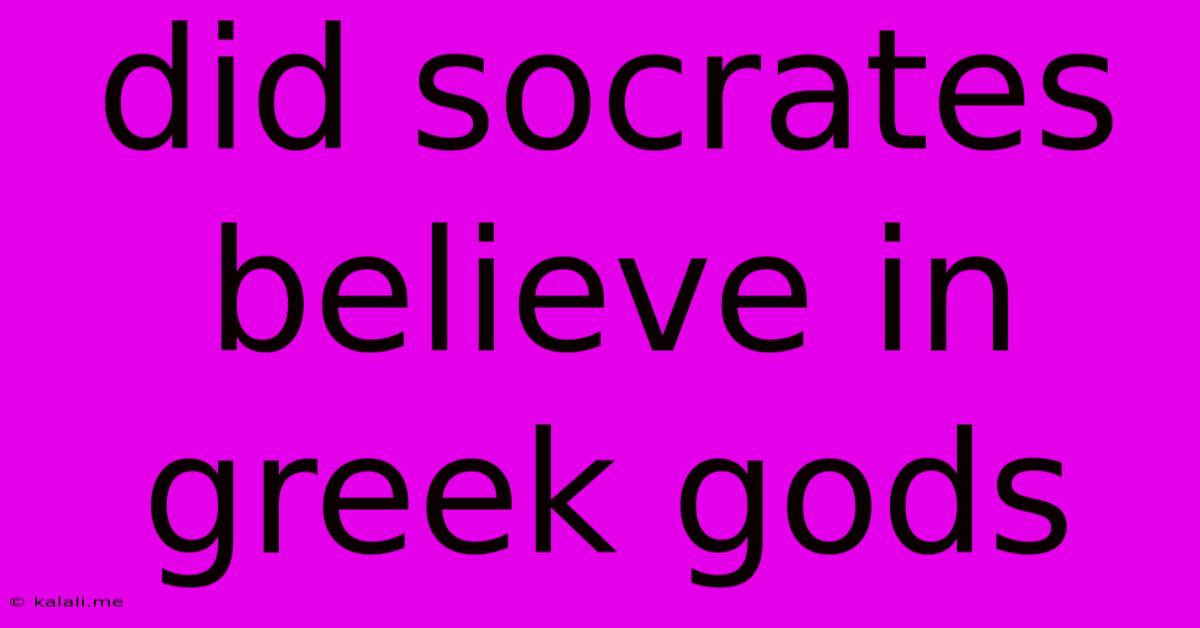Did Socrates Believe In Greek Gods
Kalali
Jun 09, 2025 · 3 min read

Table of Contents
Did Socrates Believe in the Greek Gods? A Complex Question
Socrates' views on the Greek gods are a subject of ongoing scholarly debate. While he never explicitly denied the existence of the gods, his unconventional approach to religion and his emphasis on reason led many to question the nature of his belief. This article will explore the complexities of Socrates' religious views, examining the evidence and arguments surrounding his faith in the traditional Olympian pantheon. Understanding this is crucial to grasping his philosophical contributions and his eventual trial and execution.
The Charges Against Socrates and the Issue of Impiety
One of the primary charges leveled against Socrates during his trial was impiety (ἀσεβία - asebeia). This accusation stemmed from his questioning of traditional religious beliefs and practices, not necessarily from a complete rejection of the gods themselves. His method of questioning, known as the Socratic method, challenged established authorities and dogmas, including those related to religious matters. This relentless questioning, coupled with his sometimes provocative pronouncements, contributed to the perception of impiety among his detractors.
Socrates' "Daemon": A Unique Spiritual Experience
A significant element in understanding Socrates' religious stance is his reference to a "daemon" (δαίμων - daimon). This daemon is not a demon in the modern, evil sense. Rather, it is described as a divine sign or inner voice that guided him, often warning him against certain actions. This experience, unique to Socrates, complicates any straightforward assessment of his belief in the traditional Greek gods. Was his daemon a manifestation of one of the Olympian gods, or something entirely different? The texts offer no definitive answer, fueling the ongoing discussion.
Evidence Suggesting Belief in the Gods:
-
References to the Gods in his Writings: While Socrates didn't leave behind any written works, Plato's dialogues portray him engaging with and referencing the gods, albeit often critically. These references, however, don't necessarily signify unwavering faith, but could be interpreted as acknowledging the beliefs prevalent in Athenian society.
-
Socrates' Piety in Practice: Certain accounts depict Socrates engaging in religious practices, such as participating in religious festivals and offering prayers. However, the extent to which these actions reflected genuine faith or simply social conformity is debatable.
-
The Apology: In Plato's Apology, Socrates defends himself against the charges of impiety, attempting to clarify his beliefs. While this defense doesn't fully dispel the ambiguity surrounding his religious views, it suggests an awareness of and sensitivity to the religious sensibilities of his contemporaries.
Evidence Suggesting Skepticism Towards Traditional Religion:
-
Critiquing Religious Beliefs: Socrates famously engaged in rigorous questioning of religious beliefs and practices, exposing inconsistencies and contradictions within traditional doctrines. This critical approach, while not necessarily a denial of the gods, challenged the unquestioning acceptance of religious authority.
-
Focus on Reason and Virtue: Socrates emphasized the importance of reason and virtue in human life. This focus on rational inquiry might have lessened the importance of traditional religious belief in his personal philosophy, although it didn't necessarily replace it entirely.
Conclusion: A Nuance Beyond Simple Belief or Disbelief
In conclusion, the question of whether Socrates believed in the Greek gods is not easily answered with a simple "yes" or "no." His relationship with religion was complex and nuanced, characterized by both a pragmatic acceptance of societal norms and a critical examination of traditional religious beliefs. His reliance on reason, his unique experience with his daemon, and the ambiguous evidence from Plato's dialogues all contribute to the enduring mystery surrounding his religious views. Scholars continue to debate this fascinating aspect of one of history's most influential philosophers. The ambiguity itself contributes to the enduring legacy and ongoing discussion surrounding Socrates’ place in the history of philosophy and religious thought.
Latest Posts
Latest Posts
-
White Spots And Holes On Rose Leaves
Jun 09, 2025
-
Fast Blow Vs Slow Blow Fuse
Jun 09, 2025
-
How To Replace Light Bulb In Ceiling Fan
Jun 09, 2025
-
Best Glue To Stick Metal To Plastic
Jun 09, 2025
-
How Many Focus Points Do You Start With Pathfinder 2e
Jun 09, 2025
Related Post
Thank you for visiting our website which covers about Did Socrates Believe In Greek Gods . We hope the information provided has been useful to you. Feel free to contact us if you have any questions or need further assistance. See you next time and don't miss to bookmark.